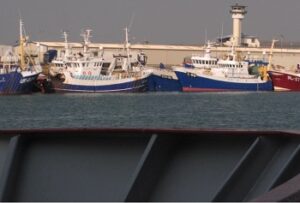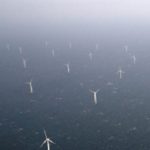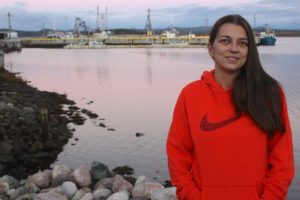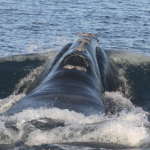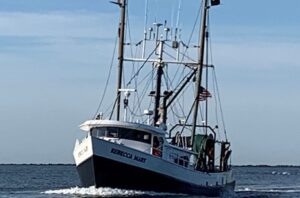Daily Archives: May 17, 2013
Two Bering Sea pollock processors lied about catches, feds say
The National Oceanic and Atmospheric Administration’s law enforcement division issued notices of violation to American Seafoods Company on May 8. The notices accuse the company of manipulating flow scales measuring B
 ering Sea pollock catches in nearly 200 hauls of fish in 2011 and 2012, causing the scales to register lower weights. Operators of the Ocean Rover and the Northern Eagle then recorded loads of fish that were lighter than what they truly carried, the NOAA notices say. continued
ering Sea pollock catches in nearly 200 hauls of fish in 2011 and 2012, causing the scales to register lower weights. Operators of the Ocean Rover and the Northern Eagle then recorded loads of fish that were lighter than what they truly carried, the NOAA notices say. continued
Non-pelagic trawlers hit halibut limit in Gulf, BSAI plaice TAC achieved
![]() Vessels using trawl gear in the Gulf of Alaska cannot target deep-water species from May 18 to July 1. The National Marine Fisheries Service, or NMFS, announced today that the directed trawl fishery for deep-water species had reached its second seasonal apportionment of halibut. continued
Vessels using trawl gear in the Gulf of Alaska cannot target deep-water species from May 18 to July 1. The National Marine Fisheries Service, or NMFS, announced today that the directed trawl fishery for deep-water species had reached its second seasonal apportionment of halibut. continued
National Marine Fisheries Service to consider listing for lake harbor seals
THE ASSOCIATED PRESS – ANCHORAGE — The National Marine Fisheries Service announced Thursday it will consider listing a population of harbor seals that live in a freshwater Alaska lake as a threatened or endangered species, a decision that could affect the massive Pebble Mine development project. continued
Film chronicles stories of a changing Seabreeze
StarNewsOnline.com – “A Sense of Place,” which explores local coastal history from the unique perspective of area black fishermen and women, will premiere Friday night at the N.C. Aquarium at Fort Fisher.
When Joe Farrow Jr. and Luther Hardis McQuillan first started fishing the Intracoastal Waterway at Myrtle Grove Sound as children in the 1930s, Seabreeze was bustling with tourists and the black resort town was known for its clam fritters and juke joints. In those days, the men – now 84 and 90, respectively – would fish with family members and sell their catch of mullet, speckled trout and flounder to one of the restaurants in the little community north of Carolina Beach, or to fish markets in Wilmington. Their wooden boats didn’t have motors and were often homemade. continued
Jancie Sue & Joy: The Boats of Fishtown on Lake Huron
LELAND — Fishtown is still an active commercial fishing community with the help of it’s two tug ladies: the Janice Sue and the Joy. 7&4’s Holly Baker met with the Executive Director of the Fishtown Preservation Society, Amanda Holmes, and learned a bit more about the personalities of each boat in Historic Fishtown. video
Holmes, and learned a bit more about the personalities of each boat in Historic Fishtown. video
In depth article: Climate Change Impacts Ripple Through Fishing Industry While Ocean Science Lags Behind
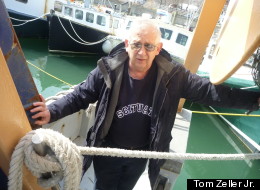 Huffington Post – With a limberness that defies his 69 years, Frank Mirarchi heaves himself over the edge of a concrete wharf and steps out onto a slack, downward sloping dock line bouncing 20 feet above the lapping waters near Scituate, Mass. continued
Huffington Post – With a limberness that defies his 69 years, Frank Mirarchi heaves himself over the edge of a concrete wharf and steps out onto a slack, downward sloping dock line bouncing 20 feet above the lapping waters near Scituate, Mass. continued
2013 Season, 61st Year of the International Dory Races – goodmorninggloucester
The weather is improving and eliminations to qualify to race the Canadians are only a few weeks away (Saturday, June 8th). I hope your training is well on its way! continued 
Report: Septic systems big contributor to Great Bay pollution (Its more than a regional issue. It’s a national issue.)
![]() PORTSMOUTH — Sources of nonpoint nitrogen pollution in the Great Bay estuary are spread out almost equally between septic systems, fertilizers and atmospheric pollution, according to a new report. continued View the full DES report and supporting documents here (note there are no Big Green partners on the website)
PORTSMOUTH — Sources of nonpoint nitrogen pollution in the Great Bay estuary are spread out almost equally between septic systems, fertilizers and atmospheric pollution, according to a new report. continued View the full DES report and supporting documents here (note there are no Big Green partners on the website)
Fish processor says contract breach cost it millions
![]() D’Eon Fisheries Ltd. of West Pubnico alleged in Nova Scotia Supreme Court documents filed Wednesday that defendants Scotia Harvest Seafoods Inc. of Digby and Marro Management Inc. of Lower West Pubnico breached a 2006 contract with the plaintiff. “By the terms of the contract, Scotia and Marro were to provide all of the groundfish to operate the processing line and to fish D’Eon’s hake quota until 2015,” the plaintiff claimed. “In breach of contract, Scotia and Marro stopped providing D’Eon with groundfish in January 2012, and stopped fishing the silver hake quota in June 2012.” continued
D’Eon Fisheries Ltd. of West Pubnico alleged in Nova Scotia Supreme Court documents filed Wednesday that defendants Scotia Harvest Seafoods Inc. of Digby and Marro Management Inc. of Lower West Pubnico breached a 2006 contract with the plaintiff. “By the terms of the contract, Scotia and Marro were to provide all of the groundfish to operate the processing line and to fish D’Eon’s hake quota until 2015,” the plaintiff claimed. “In breach of contract, Scotia and Marro stopped providing D’Eon with groundfish in January 2012, and stopped fishing the silver hake quota in June 2012.” continued
Fish fleeing for cooler waters spells trouble
![]() There is “terrible, terrible” news this week for anyone involved with the world’s fisheries, says Peter Shelley of the Conservation Law Foundation. .”I think the managers have done a pretty lousy job in managing fisheries even when the ecosystem wasn’t changing,” Shelley told me Thursday. “As far as the prospects for improvement when it is changing, I’m not hopeful.” continued
There is “terrible, terrible” news this week for anyone involved with the world’s fisheries, says Peter Shelley of the Conservation Law Foundation. .”I think the managers have done a pretty lousy job in managing fisheries even when the ecosystem wasn’t changing,” Shelley told me Thursday. “As far as the prospects for improvement when it is changing, I’m not hopeful.” continued
Interesting to note that we’ve been managing the fisheries for around 40 years, and this new study should be enough to make the enviro’s understand that killing off the New England Ground Fish Fleet by blaming them as the culprits of eco doom very well could be wrong! This important study is vindication. I think Peter Shelley and the role the enviros have played in fishery management must be scrutinized. Time to lean in hard.
Not to mention the huge increase our Canadian brothers are seeing in Ground Fish!!
Warming Waters Are Changing Global Fish Catches – Pew Croaker Chimes in, but he don’t get it.
90.9wbur – “Populations of blue crab, which is something we think as being something we see in the Chesapeake Bay,” Crawford said. “We see Atlantic croaker, which we think of as a mid-Atlantic species moving increasingly northward.” And he sees far fewer cod, too. Audio


































